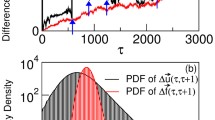Abstract
We consider a simple-model population, whose individuals react with a certain delay to temporal variations of their habitat. We investigate the impact of such a delayed-answer on the survival chances of the population, both in a periodically changing environment, and in the case of an abrupt change of it. It is found that for populations with low degree of mutation-induced variability, being “slow-reacting” decreases the extinction risk due to environmental changes. On the contrary, for populations with high mutation amplitude, the delayed reaction reduces the survival chances.
Similar content being viewed by others
References
I. Bena, M. Droz, J. Szwabiński, A. Pękalski, Phys. Rev. E 76, 011908 (2007)
C.M. Pease, R. Lande, J.J. Bull, Ecology 70, 1657 (1989)
R. Lande, Am. Nat. 142, 911 (1993)
K. Sznajd-Weron, A. Pękalski, Physica A 269, 527 (1999)
C. Tessone, C. Mirasso, R. Toral, J.D. Gunton, Phys. Rev. Lett. 97, 193101 (2006)
L. Gaimmaitoni, P. Hänggi, P. Jung, F. Marchesoni, Rev. Mod. Phys. 70, 223 (1996)
M. Zawierta, P. Biecek, W. Waga, S. Cebrat, Th. Biosc. 125, 123 (2007)
P.M. Thompson, J.C. Ollason, Nature 413, 417 (2001)
C. Both, M.E. Visser, Nature 411, 296 (2001)
A.D. Anders, E. Post, J. Anim. Ecol. 75, 221 (2006)
P.J. Weatherhead, Oecologia 144, 168 (2005)
C. Both, S. Bouwhuis, C.M. Lessells, M.E. Visser, Nature 441, 81 (2006)
I. Hanski, Nature 396, 41 (1998)
One of the first paper on this subject (that counts by now a huge bibliography) is: P.J. Wangersky, W.J. Cunningham, Ecology 38, 136 (1957)
R. Bürger, M. Lynch, Evolution 49, 201 (1995)
For a pedagogical introduction to finite-size effects in the context of different nonequilibrium phase transitions, see R. Toral, C.J. Tessone, Commun. Comput. Phys. 2, 177 (2007)
Author information
Authors and Affiliations
Corresponding author
Rights and permissions
About this article
Cite this article
Bena Coppex, I., Droz, M., Szwabiński, J. et al. How bad is to be slow-reacting?. Eur. Phys. J. B 65, 341–346 (2008). https://doi.org/10.1140/epjb/e2008-00157-2
Received:
Revised:
Published:
Issue Date:
DOI: https://doi.org/10.1140/epjb/e2008-00157-2




